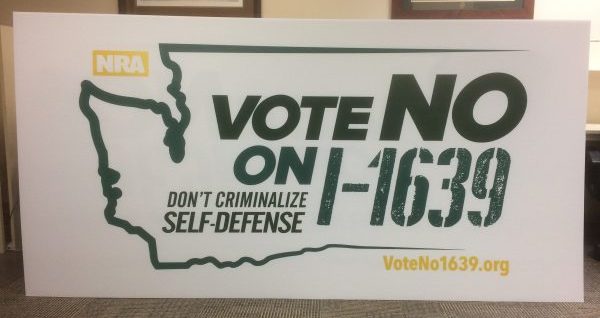
Monday’s denial of a motion to dismiss a federal lawsuit challenging provisions of Washington Initiative 1639, a gun control measure passed in November 2018, amounts to a loss for the Seattle-based gun prohibition lobby and state Attorney General Bob Ferguson, who endorsed the measure early in the campaign.
The lawsuit, brought by the Second Amendment Foundation and National Rifle Association, may move forward, according to an NRA news release. Joining SAF and NRA are two Evergreen State firearms retailers—one in Spokane and the other in the Vancouver area—and four young adults whose Second Amendment rights are directly impacted by the initiative.
I-1639 prohibits sales of so-called “semiautomatic assault rifles” to anyone under age 21, even though citizens over age 18 can vote, join the military, get married, start businesses and take out loans. The argument that those under age 21 “can’t buy beer, either” is specious at best because drinking beer is not covered by the Constitution, but keeping and bearing arms is.
The initiative also defined something that really doesn’t exist, the “semiautomatic assault rifle.” The definition is so broad that it applies to every self-loading rifle, whether a centerfire or rimfire, that has ever been manufactured. I-1639 also requires proof of training within the previous five years, so-called “enhanced background checks” and the payment of a fee, which opponents said amounts to a “poll tax.”
U.S. District Judge Ronald B. Leighton noted in his ruling that, “When the plaintiff has alleged an intention to engage in a course of conduct arguably affected with a constitutional interest, but proscribed by a statute, and there exists a credible threat of prosecution thereunder, he should not be required to await and undergo a criminal prosecution as the sole means of seeking relief.”
This is a far different outcome of an earlier challenge to Initiative 594 in 2015. That lawsuit was dismissed when U.S. District Court Judge Benjamin Settle ruled the plaintiffs’ “have failed to show a genuine or imminent threat of prosecution,” and thus lacked “standing” to bring a challenge, the Seattle P-I.com reported at the time.
Back then, the anti-gun-rights Everytown for Gun Safety—the Michael Bloomberg-backed gun prohibition lobbying group in New York that helped bankroll the I-594 campaign—issued a gloating news release. This time, there has been silence from the gun control crowd.
SAF founder and Executive Vice President Alan Gottlieb wasn’t gloating, but he was relieved that the legal action may now move forward.
NRA, SAF and the other plaintiffs are challenging I-1639 on constitutional grounds, including the Second Amendment, plus the commerce clause, which directly affects the dealers.
Opponents of the initiative argued that it would not prevent violent crimes, as backers intimated during the campaign. In the years since I-594 was passed, mandating so-called “universal background checks,” there has been no indication that it prevented a single violent crime. Two shootings with multiple victims occurred in 2016, nearly two years after I-594 was passed.
More recently, two high-profile gun store burglaries in Western Washington have underscored the fact that criminals do not get their firearms by legal means, and they don’t bother with background checks.